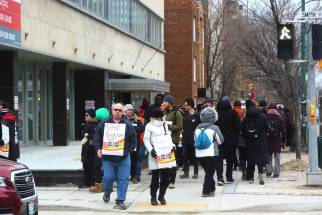Federal employees boisterous as PSAC strike rolls out across country
Read this article for free:
or
Already have an account? Log in here »
To continue reading, please subscribe:
Monthly Digital Subscription
$1 per week for 24 weeks*
- Enjoy unlimited reading on winnipegfreepress.com
- Read the E-Edition, our digital replica newspaper
- Access News Break, our award-winning app
- Play interactive puzzles
*Billed as $4.00 plus GST every four weeks. After 24 weeks, price increases to the regular rate of $19.00 plus GST every four weeks. Offer available to new and qualified returning subscribers only. Cancel any time.
Monthly Digital Subscription
$4.75/week*
- Enjoy unlimited reading on winnipegfreepress.com
- Read the E-Edition, our digital replica newspaper
- Access News Break, our award-winning app
- Play interactive puzzles
*Billed as $19 plus GST every four weeks. Cancel any time.
To continue reading, please subscribe:
Add Free Press access to your Brandon Sun subscription for only an additional
$1 for the first 4 weeks*
*Your next subscription payment will increase by $1.00 and you will be charged $16.99 plus GST for four weeks. After four weeks, your payment will increase to $23.99 plus GST every four weeks.
Read unlimited articles for free today:
or
Already have an account? Log in here »
Hey there, time traveller!
This article was published 19/04/2023 (918 days ago), so information in it may no longer be current.
Thousands of federal government employees, including in Manitoba, hit the bricks Wednesday to demand higher wages and have the right to remote work enshrined in their contract.
Outside the Service Canada building at Broadway and Smith Street, hundreds of strikers carried signs that read, “We can’t support you without your support,” “2 per cent is a pay cut” and “Wanted: fair deal,” as a brass band played union songs touting solidarity.
Many drivers honked in support and picketers, who braved the chilly and windy weather, were treated to hot coffee by members of the public.
MIKE DEAL / WINNIPEG FREE PRESS The strike action affects PSAC members working for the Treasury Board and Canada Revenue Agency.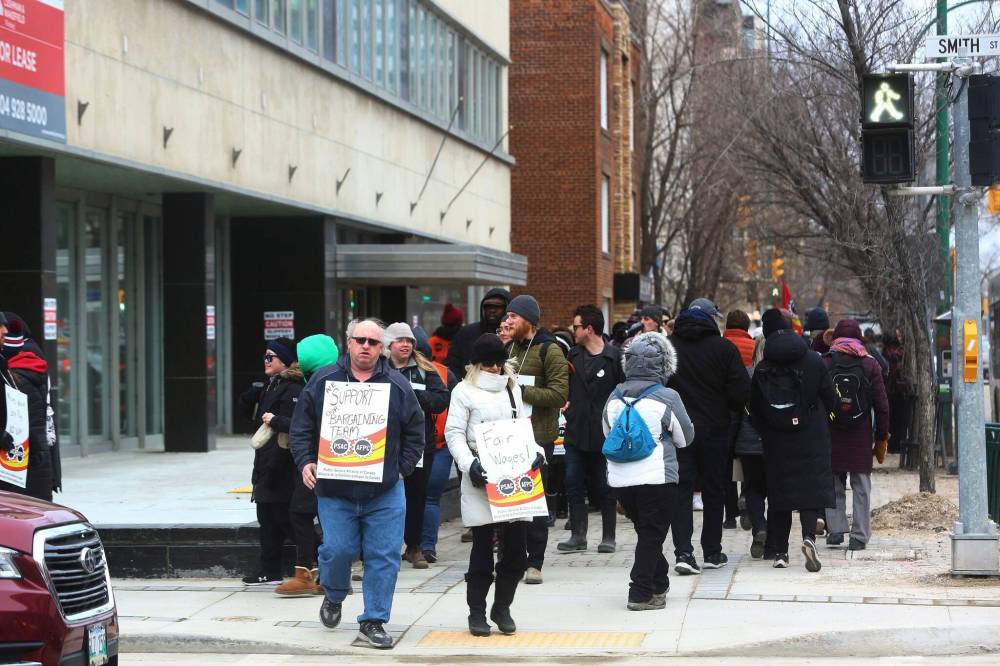
“The voters came out strong, and in great numbers, and said yes to this strike if we could not finally get a legitimate collective agreement,” said strike captain Tannis Dorward. “To see this much action and support is beautiful.”
Across the country, more than 155,000 public servants — nearly one-third of the federal civil service — including 9,000 across Manitoba, went on strike at 6 a.m. after Ottawa and the Public Service Alliance of Canada failed to reach a deal Tuesday.
The strike action affects PSAC members who work for the Treasury Board and Canada Revenue Agency.
The Treasury Board advised that service delays, including by the Canada Revenue Agency, are expected. The income tax filing deadline — May 1 — will not be extended, it said.
“The voters came out strong, and in great numbers, and said yes to this strike if we could not finally get a legitimate collective agreement… To see this much action and support is beautiful.”–Strike captain Tannis Dorward
Passport processing, immigration, refugee and citizenship applications, and processing income tax and benefit returns may also be delayed.
The Canada Border Services Agency said while 17.6 per cent of its employees are on strike, border guards will remain on the job and delays are not anticipated.
Strikers upset mall traffic
A local strip mall handed out warning slips to striking workers after they walked down Regent Avenue near the Canadian Revenue Agency building.
Lilly Koenig, a dental hygienist at Aqua Dental Wellness in the Kildonan Market mall, said multiple appointments were cancelled or rescheduled because elderly patients weren’t able to find close parking or weren’t comfortable crossing through the crowds of people Wednesday morning.
A local strip mall handed out warning slips to striking workers after they walked down Regent Avenue near the Canadian Revenue Agency building.
Lilly Koenig, a dental hygienist at Aqua Dental Wellness in the Kildonan Market mall, said multiple appointments were cancelled or rescheduled because elderly patients weren’t able to find close parking or weren’t comfortable crossing through the crowds of people Wednesday morning.
“None of us have a problem with the protest in and of itself, because everybody wants to be paid what they deserve, everybody wants to have benefits and be able to work from home and have that flexibility, but blocking off parking lots, and the way they’re going about it,” she said. “They should be protesting at the CRA building.”
It resulted in the property manager warning people parking in the Kildonan Market lot that they could be towed if they weren’t there to visit the strip mall. People had dispersed by around 10 a.m.
PSAC regional executive vice-president for the prairies Marianne Hladun said many picketers are using public transit, and that while the crowds are large, many picket lines are scheduled to shut down by 2 p.m.
“Everyone that’s on a picket line here lives in Winnipeg, so we would expect them to respect reserved signs, but if they’re in public parking areas, then they’re public ones that anyone can use,” she said.
Negotiations began in June 2021, but have stalled over the issues of wage increases, remote work options and contracting out, the union said. Other issues include: creating a more inclusive workplace, and having the right to disconnect from work in non-working hours.
The Treasury Board has offered an average wage increase of 2.06 per cent annually from 2021-25, according to PSAC, which calls the number “insulting.”
A statement from the Canada Revenue Agency said it had offered its employees a 9.0 per cent wage increase over three years, and PSAC countered with a 22.5 per cent raise over three years, including a market adjustment of 2.0 per cent.
Marianne Hladun, the union’s regional executive vice-president for the Prairies, said she was disappointed to see “statements like that put out”.
“If the bargaining team that’s been elected by the members says this is not enough, then they’re going to stay in negotiations. We’re prepared to stay at the table, and have those negotiations, but there also has to be a willingness to move on behalf of the employers.”
University of Manitoba labour studies professor David Camfield said he doesn’t believe the strike will go on for long.
He believes it could be precedent-setting if the workers gain rights related to working remotely.
MIKE DEAL / WINNIPEG FREE PRESS Negotiations between PSAC and the government began in June 2021 but have been halted since last May.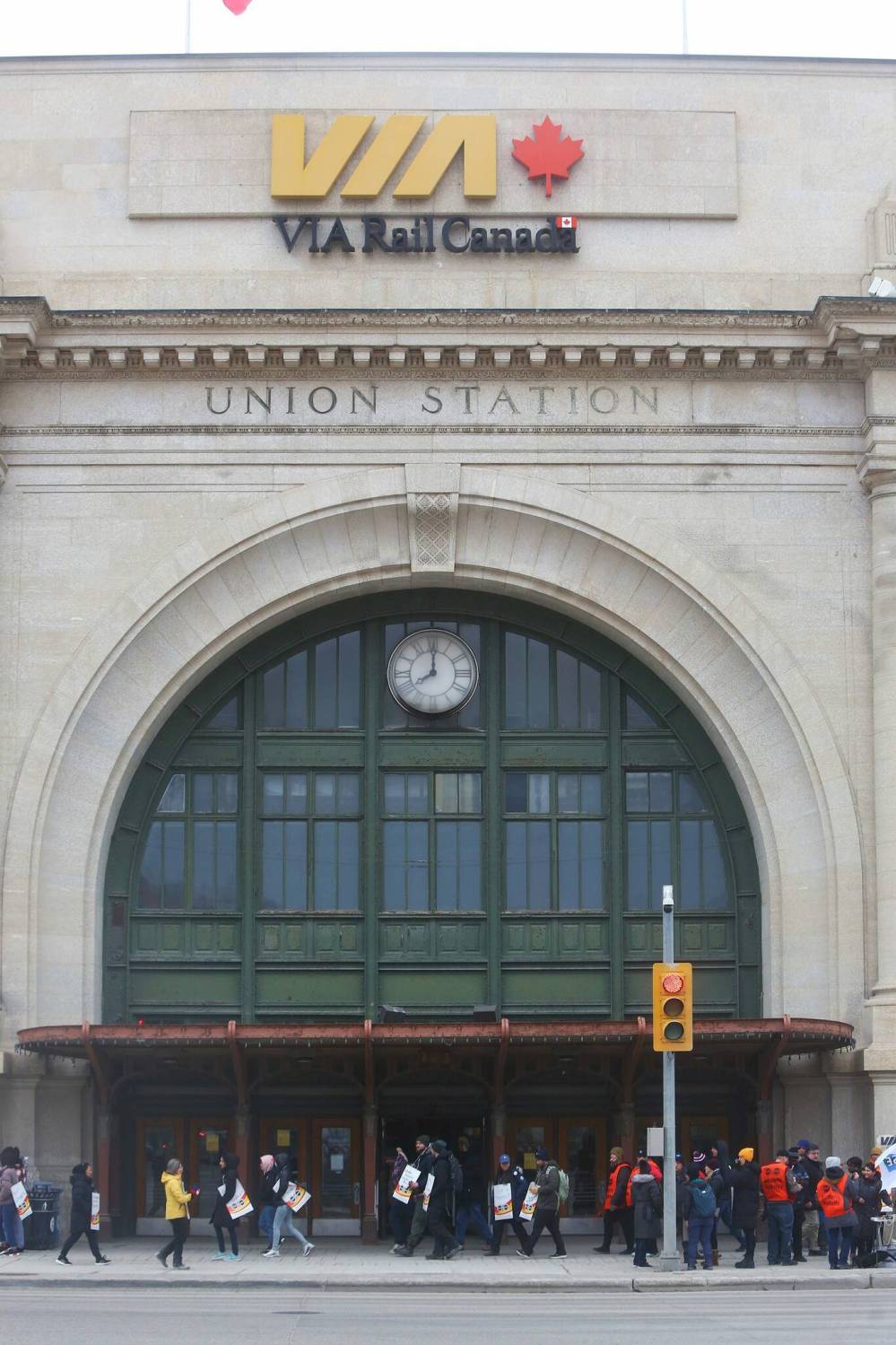
“I do think this is an emerging issue,” he said.
“If the union (doesn’t) succeed, that sets a precedent, if the union does make some gains… that’ll also be something that will affect the expectations of other workers and other employers,” he said.
Many PSAC employees were able to work fully remotely during the pandemic and have called the return-to-work mandate — for at least two days a week — unfair. Camfield said despite workers having successfully worked from home, he believes it’s a topic the government does not want to budge on.
“This is something where I think management doesn’t want to have to cede any rights. I think they would prefer to be able to unilaterally make those decisions without having anything in the collective agreement that would constrain them,” he said.
Since 2019, unionized workers in Canada have had an overall wage loss of 2.2 per cent, and non-union workers have gained 3.3 per cent, Camfield said.
Need to know
A look at federal services affected by the strike
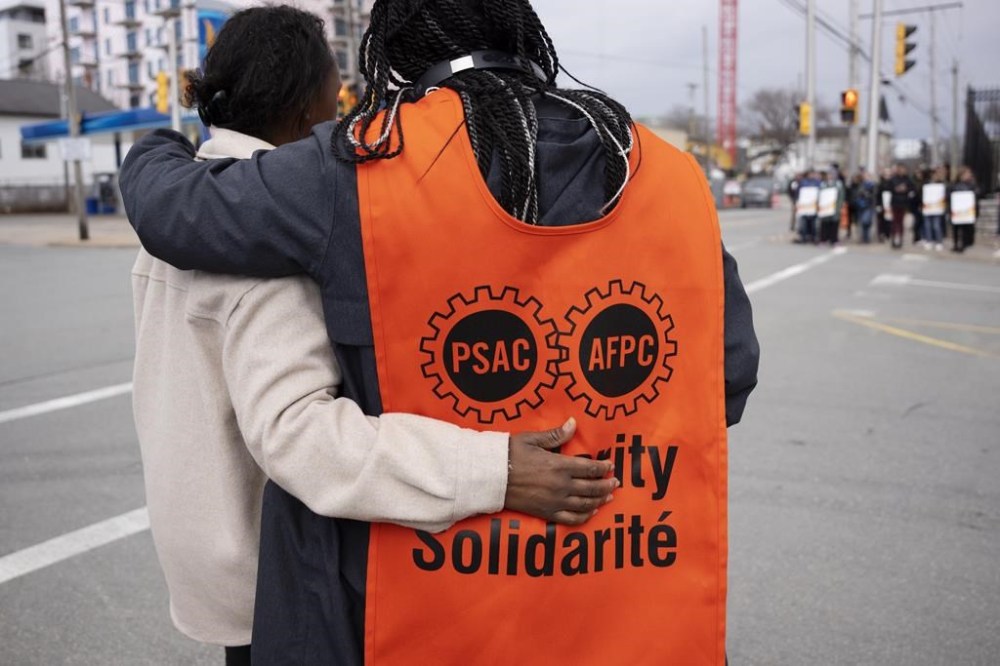
Posted:
Federal departments and agencies have released a list of services that may be disrupted during the strike. Here's an updated list of what services may be affected:
“The idea that somehow unionized workers have been doing really well in the last number of years, while other people have not been doing really well is not supported by the Statistics Canada evidence,” he said.
“In fact, PSAC members, like many other union members, have actually seen the actual inflation-adjusted value of their wages fall. That needs to be factored in because of the stereotypes and myths that are circulating.”
Back on the picket line, Dorward said the federal government hasn’t negotiated in good faith in the past two years.
“It’s a government strategy to postpone getting a collective agreement,” she said. “This is not the first time we’ve gone through this.”
One picketer spoke about the length of time that has passed without an agreement.
“If you’re working for the federal government, and you’re not making wages that are moving with the economy, that doesn’t make any sense,” she said. “We have to keep up with inflation.”
Another said she has to work a second job to make ends meet, and knows many others in the same situation.
“I want to support our fellow workers,” she said. “I’ve been working with the federal government now since 2020, and most of the people I know are highly underpaid, and they’re working their butts off.”
MIKE DEAL / WINNIPEG FREE PRESS Members of the Public Service Alliance of Canada walked off the job this morning. There were dozens of picketers at 280 Broadway Wednesday morning.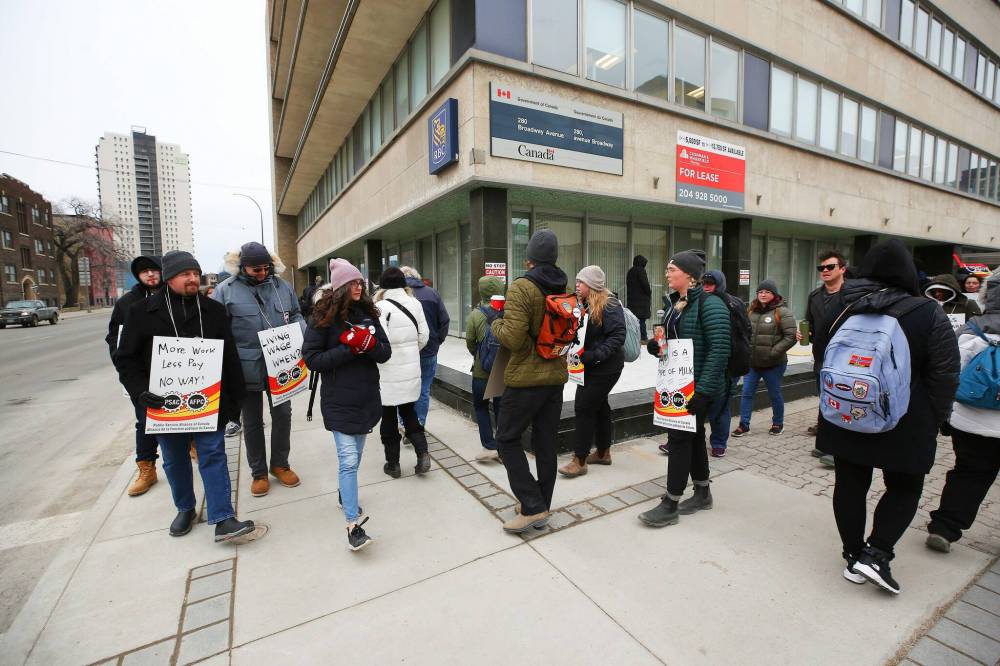
Some worry about the delay in service delivery the strike will inevitably prompt. Keystone Agricultural Producers said it could create backlogs in grain shipments and extra demurrage costs for grain companies, since Canadian Grain Commission employees are affected by the strike.
“KAP calls on both PSAC and the Government of Canada to continue an open dialogue through negotiations, with adequate contingencies in place to minimize negative impacts on the grain-handling system and ensure that all agricultural programs continue to be delivered uninterrupted,” president Jill Verwey said in a statement.
malak.abas@freepress.mb.ca

Malak Abas is a city reporter at the Free Press. Born and raised in Winnipeg’s North End, she led the campus paper at the University of Manitoba before joining the Free Press in 2020. Read more about Malak.
Every piece of reporting Malak produces is reviewed by an editing team before it is posted online or published in print — part of the Free Press‘s tradition, since 1872, of producing reliable independent journalism. Read more about Free Press’s history and mandate, and learn how our newsroom operates.
Our newsroom depends on a growing audience of readers to power our journalism. If you are not a paid reader, please consider becoming a subscriber.
Our newsroom depends on its audience of readers to power our journalism. Thank you for your support.
History
Updated on Friday, April 21, 2023 11:06 AM CDT: Clarifies graph

















